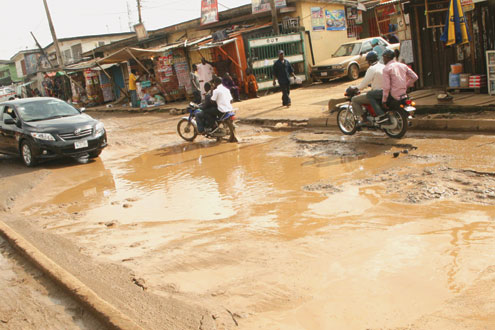Repair our roads or we quit voting, Ajuwon residents warn

Despite the immense significance of the Ajuwon-Junction Road which sandwiches Iju-Ishaga in Lagos state and Akute in Ogun state, it has suffered remarkably from government neglect. The Ajuwon Junction is like the heart-beat of the area and holds a road which links Lambe, Matogun, Alausa, Koye, Agbadu, Berger and the Ajuwon-Akute area.
In addition, it hosts a central market, shops, churches, fuel station, amongst other facilities. Yet, the roads are narrow, filled with deep, ugly potholes and dirty gutters and have been left bare of asphalt for decades.
The Daily Times paid visit to the area over the weekend was welcome and residents as well as motorists bared their minds:
“The roads have been horrible for years despite all the taxes we pay. But during every electoral campaign, politicians come with empty promises to fix the roads only to disappear after they win,” began a prominent resident.
“These politicians must be thinking we are fools. Their cups are getting full and we can’t take it anymore. Either they fix our roads or we would stop voting and start a campaign to join Lagos state,” he warned.
A tricycle rider, Michael Afolabi further explained that the Iju-Elliot area was once part of Ogun state with very poor infrastructure, but since they were adopted by Lagos state, they can now boast of good roads and schools.
A bike rider who chose to remain anonymous revealed that the only facilities they enjoy such as portable water and electricity come from Lagos state although they pay all their taxes to Ogun state.
Transportation in this area, especially during the rainy season is a nightmare, bus driver, Iniedo lamented. “Several accidents have happened leading to painful deaths and injuries because the road is too narrow. The potholes are so deep that they cause vehicles to break down or overturn; people fall down from bikes as they undulate from one deep pothole to the other.”
Iniedo added that the traffic caused by the situation is horrible and vehicles often sink in the potholes, requiring strong men to push them out year in year out.
Pastor Adoloye of the Redeem Christian Church of God (RCCG) LPS, who owns a tricycle acknowledged that a sigh of relief comes once in a long while when one Mr. Wadoye uses his own money to sandfill the roads.
“Neither the Local Government Chairman nor the Governor have made any attempt to fix the road despite appeals made by a local NGO, Community Development Association (CDA) and other youth groups. “In a bid to avoid the poor roads, drivers are compelled to drive longer distances to arrive at their respective destinations.”
The cleric cited the fact that buses from Baale do not pass through Ajuwon on their way to Agege anymore and have to go the longer way through Lagos and added that few drivers and inhabitants don’t even pack their cars in Ajuwon but prefer to pack it in Lagos because the place is so dirty. “Drivers in Ajuwon do not even border to wash their vehicles because they know they are going to get soaked in the muddy, dirty waters on the roads,” he said sadly.
As if these are not enough, The Daily Times drivers suffer from police harassment and are compelled to pay high taxes, amounting to a about N2000 a day. “Policemen harass us, burst the tires of our cars and force us to bribe them. Corruption is an even greater issue in this area,” tricycle operator, Oladele lamented, showing the TORAN tax ticket on which N300 was written but for which he was asked by the police to pay N800 instead.
Another tricycle rider, Ogunshola Olabisi, lamented that transportation fare has increased due to the high cost of vehicular maintenance, and customers’ complaint has resulted in shortfall to their daily income.
“Because of these challenges, vehicles registered under the Ifo Local Government Area (under which Ajuwon is placed) have dropped to four times less,” he said.
An entrepreneur, Chidi Nwafia, lamented that whenever it rains, “The place is transformed into a river. Businesses go under as shops close because customers do not come to buy. Many businessmen have had to relocate to other places and shops and business centers have been eroded during floods, owing to the poor drainage system.
“Meanwhile, state officials knock at our doors every day to collect taxes which they use to build estates with tarred roads. This is so unfair,” Chidi he stated and added that so many jobs have been lost due to poor roads.
Newspaper vendor, Ahmed Mukiat, wondered aloud why government cannot just fulfill one of its main promises to tar the roads out of the so many empty promises made every year. He warned that if this continues, all the business men would not only stop paying taxes but also stage a mass protest.
Miss Anabel Titioluwa, a JSS3 student of Dorland Secondary school complained that she has to suffer from mud stains during the rainy season and dust during the dry season. “Most of my shoes have spoilt; I have to carry extra pair of shoes and uniform in my bag on her way to school, otherwise I will arrive school dirty.”
The Daily Times correspondent who visited the office of the Local Government, Ifo area, found the officials defensive and reticent to speak up. After several attempts to interview them, one official who chose to remain anonymous confirmed that the roads are not motorable, but blamed the residents and road users for worsening the problem by pouring dirt into the gutters and causing floods.
Asked why the roads have remained unfixed for more than two decades, he said the government is working on the roads; “They are trying to build a bridge in Akute, but unfortunately, not much can be done during the rainy season.” The official further explained that government will not allow any private individual to take initiative to construct the road for reasons he would not mention.
A female official, who spoke in confidence, expressed hope that the newly elected government would grant them Local government autonomy so that they can better relate with the people and solve their problems.






